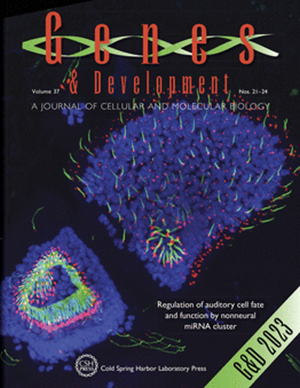The USP11/TCEAL1 complex promotes transcription elongation to sustain oncogenic gene expression in neuroblastoma
IF 7.7
1区 生物学
Q1 CELL BIOLOGY
引用次数: 0
Abstract
During early transcription, RNA polymerase II (RNAPII) undergoes a series of structural transitions controlled by cyclin-dependent kinases. How protein ubiquitylation and proteasomal degradation control the function of RNAPII is less well understood. Here we show that the deubiquitinating enzyme USP11 forms a complex with TCEAL1, a member of the TFIIS (TCEA)-like protein family. TCEAL1 shares sequence homology with the RNAPII interaction domain of the elongation factor TFIIS (which controls the fate of backtracked RNAPII) and competes with TFIIS for binding to core promoters. USP11 protects TCEAL1 from proteasomal degradation, and TCEAL1 recruits USP11 to RNAPII. Both USP11 and TCEAL1 promote transcription elongation and maintain expression of RPB8, an essential subunit of all three nuclear RNA polymerases. In neuroblastoma, USP11- and TCEAL1-dependent genes define a gene expression program that is characteristic for mesenchymal tumors, which are described as able to escape from many treatments, suggesting that the USP11/TCEAL1 complex promotes transcription elongation to support a critical oncogenic gene expression program.USP11/TCEAL1复合体促进转录延伸以维持神经母细胞瘤中的致癌基因表达
在转录早期,RNA聚合酶II (RNAPII)经历一系列由周期蛋白依赖激酶控制的结构转变。蛋白质泛素化和蛋白酶体降解如何控制RNAPII的功能尚不清楚。本研究表明,去泛素化酶USP11与TFIIS (TCEA)样蛋白家族的成员TCEAL1形成复合物。TCEAL1与延伸因子TFIIS(控制反向RNAPII的命运)的RNAPII相互作用域具有序列同源性,并与TFIIS竞争与核心启动子的结合。USP11保护TCEAL1免受蛋白酶体降解,TCEAL1将USP11招募到RNAPII。USP11和TCEAL1都能促进转录延伸并维持RPB8的表达,RPB8是所有三种核RNA聚合酶的重要亚基。在神经母细胞瘤中,USP11-和TCEAL1依赖性基因定义了一种基因表达程序,这种基因表达程序是间充质肿瘤的特征,被描述为能够逃避许多治疗,这表明USP11/TCEAL1复合物促进转录延伸以支持关键的致癌基因表达程序。
本文章由计算机程序翻译,如有差异,请以英文原文为准。
求助全文
约1分钟内获得全文
求助全文
来源期刊

Genes & development
生物-发育生物学
CiteScore
17.50
自引率
1.90%
发文量
71
审稿时长
3-6 weeks
期刊介绍:
Genes & Development is a research journal published in association with The Genetics Society. It publishes high-quality research papers in the areas of molecular biology, molecular genetics, and related fields. The journal features various research formats including Research papers, short Research Communications, and Resource/Methodology papers.
Genes & Development has gained recognition and is considered as one of the Top Five Research Journals in the field of Molecular Biology and Genetics. It has an impressive Impact Factor of 12.89. The journal is ranked #2 among Developmental Biology research journals, #5 in Genetics and Heredity, and is among the Top 20 in Cell Biology (according to ISI Journal Citation Reports®, 2021).
 求助内容:
求助内容: 应助结果提醒方式:
应助结果提醒方式:


